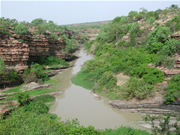Climate change: turn the tide – turn to nature
UNFCCC COP15 meeting: 7 to 18 December, Copenhagen
Leaders at Copenhagen should make robust commitments and a timetable for achieving a legally binding treaty for the post-2012 climate change regime as early as possible.

Photo: JEan de Dieu ILBOUDO
IUCN urges leaders meeting at UNFCCC COP15 to include nature’s solutions to reduce emissions and cope with impacts of climate change in a future deal. Nature is ready to provide powerful tools for both climate change mitigation and adaptation which are already available, cost-effective and sustainable. The potential benefits of a REDD (Reducing Emissions from Deforestation and forest Degradation) mechanism and the role of ecosystems in enabling people to adapt to the impacts of climate change should be recognized.
Key Issues:
• “Managing nature will play a key role in our ability to cope with the changing climate and reduce emissions,” says Julia Marton-Lefèvre, Director General of IUCN. “A massive investment in nature, in the way we protect it, manage it and govern it will take us from where we are today to a low carbon economy of the future.”
• “Managing and conserving ecosystems can increase resilience and reduce the vulnerability of people to the impacts of climate change,” says IUCN’s Head of Ecosystem Management Programme, Neville Ash. “Ecosystem-based adaptation to climate change should be included in a post-2012 adaptation framework.”
• Deforestation accounts for 20 per cent of greenhouse gas emissions. “Preventing deforestation and restoring forest areas through REDD can combat climate change in a cost-effective way while generating crucial, additional benefits for indigenous peoples, local communities and biodiversity,” says IUCN’s Director of Environment and Development Stewart Maginnis “REDD must be an integral part of a future climate deal.”
Press Material and Events:
• Monday 7 December, Opening Statement
• Wednesday 9 December, 10:00, press conference, Indigenous peoples and Climate Change. Press release and case studies.
• Thursday 10 December, 10:00, press conference: Ocean Acidification, The Facts. Press release and report.
• Friday 11 December, 11:30, press conference: Ecosystem based adaptation, Natures solution for climate change impact. Press release and case studies.
• Friday 11 December, afternoon, press trip, ‘Copenhagen kids lowering CO₂ emissions’.
• Monday 14 December, 11:30, press conference, Climate Change Impacts on Species – It’s More Than Just the Polar Bear. Press release and case studies.
• Tuesday 15 December 9:30, press conference, The Costs of REDD. Press release and report.
• Wednesday 16 December, 18:00, photo/filming opportunity around an IUCN members event, ‘Earth Hour: Elephants lit by Solar Power’ at Copenhagen Zoo.
• Wednesday 16 and Thursday 17 December, daily media brief sent to registered press
• Friday 18 December, Closing Statement.
All press conferences will be held in room Asger Jorn, Hall H, Bella Center
Photos/Audio/Video material and a daily diary from Copenhagen are available from: www.iucn.org/unfccc
Spokespersons:
Ninni Ikkala, IUCN’s Climate Change Coordinator, ninni.ikkala@iucn.org
Claire Parker, Senior Climate Change Policy Consultant claire.n.parker@btopenworld.com
Stewart Maginnis, IUCN’s Director of Environment and Development, stewart.maginnis@iucn.org (for REDD), Carole Saint-Laurent, IUCN Senior Forest Policy Advisor, carsaint@bellnet.ca (for REDD),
Neville Ash, IUCN’s Head of Ecosystem Based Management Programme ashn@iucn.org (for ecosystem-based adaptation),
Carl Gustaf Lundin, head of IUCN’s Marine Programme carl.lundin@iucn.org (for oceans)
Annelie Fincke, IUCN Social Policy annelie.fincke@iucn.org (for indigenous peoples)
Wendy Foden, IUCN Species Programme wendy.foden@iucn.org (for species)
Media Team Brian Thomson, Media Relations Manager , m +41 79 721 8326, e brian.thomson@iucn.org Pia Drzewinski, Media Relations Officer, m +41 76 505 8865, e pia.drzewinski@iucn.org



